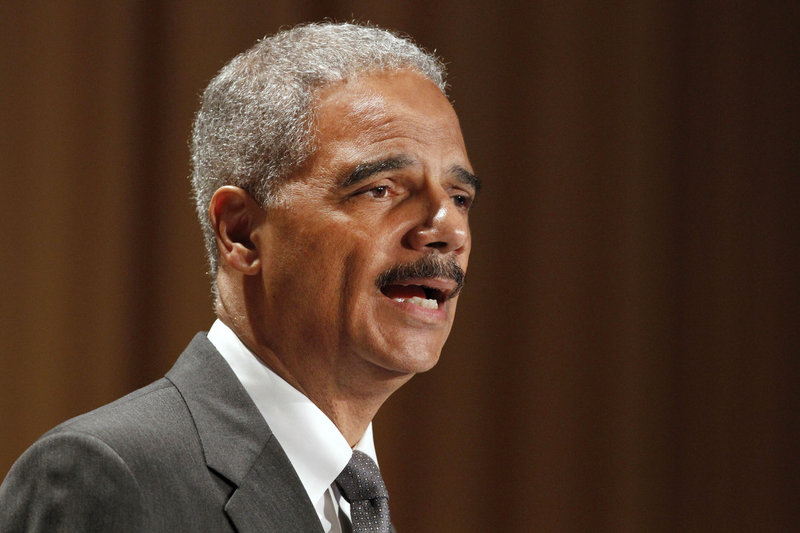WASHINGTON – Attorney General Eric Holder Jr. on Thursday defended the Justice Department’s handling of the investigation that forced David Petraeus to resign as CIA director, saying that the department was right to keep the inquiry secret from the White House until after last week’s presidential election.
Holder’s first public comments on the controversy came as the CIA opened an internal inquiry of Petraeus’ conduct during his 14-month tenure as director. The move means that there are three active investigations related to a scandal that has scrambled President Obama’s national security team.
“What we did was conduct the investigation in the way we normally conduct a criminal investigation,” Holder said at a news conference in New Orleans. He said the inquiry was handled “in an impartial way. We follow the facts. We do not share outside the Justice Department, outside the FBI, the facts of ongoing investigations.”
Holder’s remarks were aimed at quieting criticism that has grown sharper in recent days as the initial shock waves from Petraeus’ resignation have given way to questions about Justice Department decisions during its probe.
Some of those questions have focused on Fred Humphries, an FBI agent in Tampa, Fla. His concerns that the investigation had uncovered possible national security risks led to a chain of events that resulted in a House Republican leader raising the issue with the office of FBI Director Robert Mueller III.
A person close to Humphries said he had no intention of being a whistleblower, but the agent’s informal comments may have triggered the disclosure of Petraeus’ affair.
Republicans have accused Holder of withholding the results of the investigation until after the election for political motives. At the same time, some Democrats have begun to draw comparisons between the exposure of an adulterous affair by Petraeus and the bureau’s history of digging up dirt on Washington officials during the tenure of founding FBI Director J. Edgar Hoover.
“We don’t want to return to those days,” said Rep. Adam Schiff, D-Calif., a member of the House Intelligence Committee and a former federal prosecutor. “The FBI was trying to find the right line here,” he said, even as it unearthed “what may have been an affair that had nothing to do with national security.”
Lawmakers from both parties have faulted the FBI for not notifying Congress that a criminal probe had turned up compromising material on the CIA director, as well as potentially inappropriate communications between a Tampa socialite at the center of the case and Gen. John Allen, the U.S. military commander in Afghanistan.
Holder fired back Thursday, saying the Justice Department “made the determination as we were going through that there was not a threat to national security.” Because of that conclusion, he said, there was no reason to advise officials outside the department before the investigation was complete.
The FBI notified the executive branch with a call to Director of National Intelligence James Clapper Jr. on the evening of Election Day, Nov. 6. Holder said the call was made then because the bureau had “conducted a critical interview the Friday before. When we got to that point, we thought it appropriate to notify the president.”
Law enforcement officials said the “critical interview” was a Nov. 2 meeting with Paula Broadwell, the Petraeus biographer whose affair with the CIA director was exposed by the FBI investigation. The officials spoke on condition of anonymity because they were not authorized to talk publicly.
Broadwell and Petraeus are both married. The case was triggered by harassing e-mails that Broadwell sent to the Tampa woman, Jill Kelley, who was close to Petraeus and Allen.
It is unclear what FBI agents covered in that final interview with Broadwell, but the investigation has focused on her possession of classified material. She and Petraeus have denied that he was the source of any classified files.
The same question may now be at the heart of an internal CIA investigation of Petraeus’ conduct launched by the agency’s inspector general. U.S. officials described the probe as “exploratory,” suggesting a broad inquiry into whether Petraeus’ personal transgressions crossed over into professional misconduct or created a security risk.
As CIA chief, Petraeus was charged with safeguarding some of the nation’s most precious secrets. He traveled extensively and has said through associates that his affair with Broadwell began shortly after he was sworn in.
“If there are lessons to be learned from this case, we’ll use them to improve,” said CIA spokesman Preston Golson. “But we’re not getting ahead of ourselves; an investigation is exploratory and doesn’t presuppose any particular outcome.”
Send questions/comments to the editors.



Success. Please wait for the page to reload. If the page does not reload within 5 seconds, please refresh the page.
Enter your email and password to access comments.
Hi, to comment on stories you must . This profile is in addition to your subscription and website login.
Already have a commenting profile? .
Invalid username/password.
Please check your email to confirm and complete your registration.
Only subscribers are eligible to post comments. Please subscribe or login first for digital access. Here’s why.
Use the form below to reset your password. When you've submitted your account email, we will send an email with a reset code.